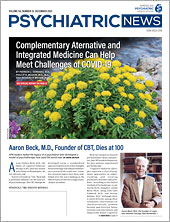People who are fully vaccinated against COVID-19 and have a substance use disorder (SUD) appear to be at higher risk for breakthrough infections than people without an SUD, according to a report in World Psychiatry.
The risk of breakthrough infection for people with SUD ranged from 6.8% for tobacco use disorder to 7.8% for cannabis use disorder. The risk of breakthrough infections in vaccinated people without an SUD was 3.6%.
“[T]he overall risk of COVID-19 among vaccinated people with substance use disorders is very low,” NIDA Director Nora D. Volkow, M.D., one of the study authors, said in a media release. “We must continue to encourage and facilitate COVID-19 vaccination among people with substance use disorders, while also acknowledging that even after vaccination, this group is at an increased risk and should continue to take protective measures against COVID-19.”
A study conducted in June 2020 found that people with substance use disorders living in the United States were at increased risk of SARS-CoV-2 infection and were more likely to have severe disease requiring hospitalization or resulting in death. (The findings were published in Nature Molecular Psychiatry.) Since then, vaccines that greatly reduce the risk of COVID-19 and severe disease have become widely available in the United States for people aged 5 years and older.
According to a NIDA media release, clinical trials evaluating the effectiveness of COVID-19 vaccines did not specifically include people with substance use disorders. Because many people with substance use disorders are immunocompromised due to drug use and co-occurring diseases, Volkow and colleagues hypothesized that this population might be at increased risk of breakthrough infections after getting vaccinated.
The researchers analyzed de-identified data from electronic health records for 30,183 fully vaccinated patients with history of SUD and 549,189 patients without SUD between December 2020 and August 2021—a period that included the Delta variant outbreak. Among the fully vaccinated population with an SUD, 7,802 patients had a diagnosis of alcohol use disorder; 2,058, cannabis use disorder; 1,011, cocaine use disorder; 2,379, opioid use disorder; and 21,941, tobacco use disorder.
The risk of breakthrough infection for individuals with any of the five SUDs was significantly higher than for individuals without an SUD: alcohol use disorder (7.2%), cannabis use disorder (7.8%), cocaine use disorder (7.7%), opioid use disorder (7.1%), and tobacco use disorder (6.8%). Additionally, the rates of hospitalization and death of SUD patients with a breakthrough infection were 22.5% and 1.7%, respectively, compared with 17.5% and 1.1%, respectively, of patients without an SUD who had a breakthrough infection.
When the researchers matched individuals with and without an SUD for lifetime comorbidities and adverse socioeconomic determinants of health, they found there was no difference in the risk of breakthrough infections between these populations, except for patients with cannabis use disorder, who remained at increased risk.
“It is fascinating that cannabis use disorder had such an impact on breakthrough infections … while tobacco use disorder did not,” Smita Das, M.D., Ph.D., M.P.H., chair of the Council on Addiction Psychiatry, told Psychiatric News.
She drew attention to the fact that the prevalence of substance use disorder in the study sample is lower than the national estimates from SAMHSA, which she suggested could explain how the difference in breakthrough risk disappeared for other SUDs when the researchers controlled for comorbidities.
“This speaks to the lack of attention to substance use and substance use disorders in medicine. By not diagnosing and documenting [these disorders], we are under-addressing the needs of a vulnerable population,” Das said. “It would be interesting to see the magnitude of the breakthrough findings with more accurate diagnosis data.”
But she said the overall risk of breakthrough infection is not surprising. “People with SUDs suffer from health disparities both from often having less access to effective care, but also by virtue of their substance use. Smoking nicotine or cannabis affects respiratory function, so it is not surprising that the risk for breakthrough infections would persist. “
Das says she encourages her patients with substance use disorders to get vaccinated and receive a booster. Earlier this year, the Centers for Disease Control and Prevention included substance use disorders among the underlying conditions that can increase risk for COVID-19 and heighten the chance of severe illness. In October that was expanded to include mood disorders. And in November Rochelle Walensky, M.D., M.P.H., director of the CDC, accepted unanimous recommendations from the agency’s Advisory Committee on Immunization Practices that anyone 18 and older may get a booster. ■
The
World Psychiatry study is posted
here.
The Nature Molecular Psychiatry study is posted
here.
The NIDA media release is posted
here.
